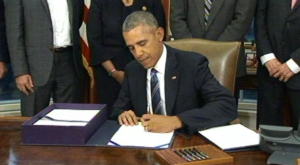Washington – President Obama late yesterday signed an important bill into law which will extend some privacy rights to citizens of certain allied countries including European Union states. Specifically, the Judicial Redress Act will give European citizens the right to review and correct inaccurate information about them held by U.S. federal agencies under the U.S. Privacy Act. U.S. citizens have similar rights in EU member states.

While passing the Judicial Redress Act was a matter of fairness, it will also allow the EU and the U.S. Government to move forward on two data sharing agreements that will improve transatlantic commerce, privacy and security. The Judicial Redress Act is the final U.S. requirement for the adoption of the EU-U.S. Data Privacy and Protection Agreement for law enforcement-related data transfers. The Judicial Redress Act also provides goodwill as the new EU-U.S. Privacy Shield, allowing safe commercial data flows, is finalised.
European Commissioner for Justice, Vera Jourová, called the President’s signature “a historic achievement in our efforts to restore trust in transatlantic data flows, paving the way to the signature of the EU-US Data Protection Umbrella Agreement.”
The Computer & Communications Industry Association has been advocating for surveillance reforms and data flows with strict privacy safeguards, for more than a decade. We have since 2014 called for the U.S. Government to extend U.S. redress rights to third country nationals and we welcome the passage of the Judicial Redress Act.
The following can be attributed to CCIA Europe Director, Christian Borggreen:
“We welcome this bill which is key to improving transatlantic trust, safety and enable commercial data flows.”
“We applaud the efforts by the EU, Congress and the Obama Administration to strengthen transatlantic privacy, security, and commercial ties.”